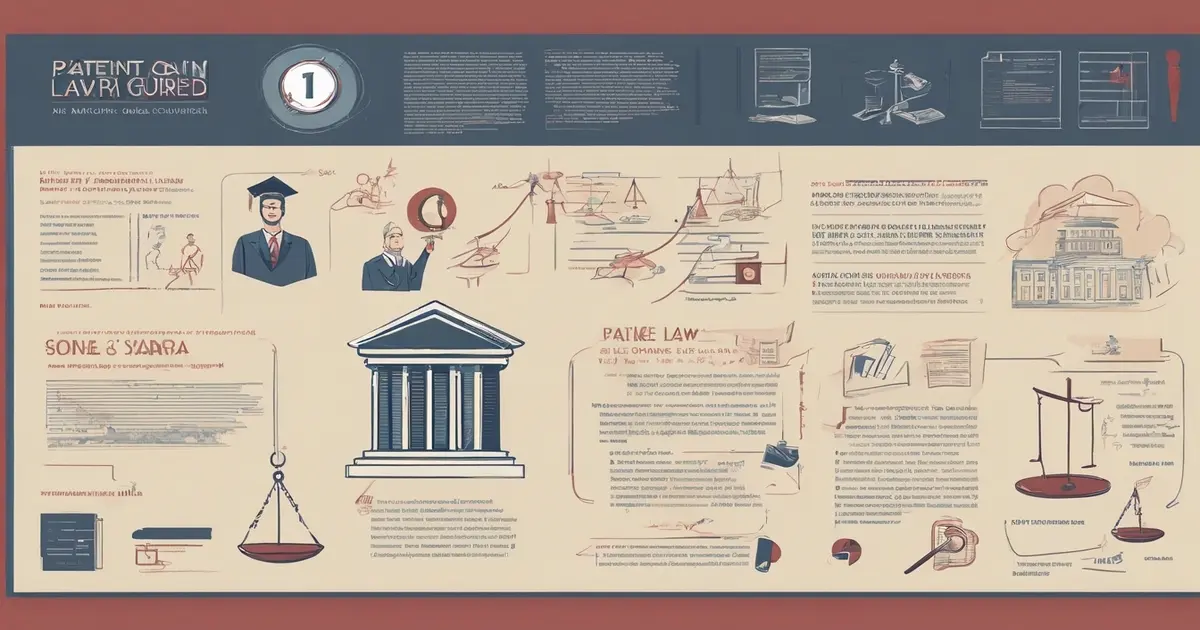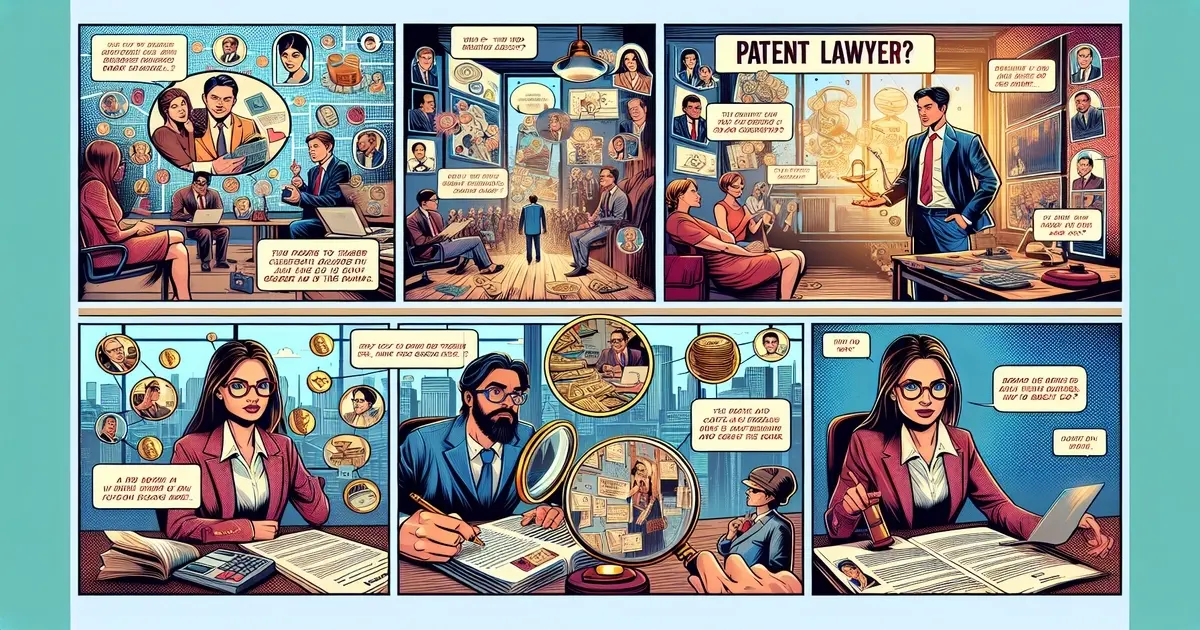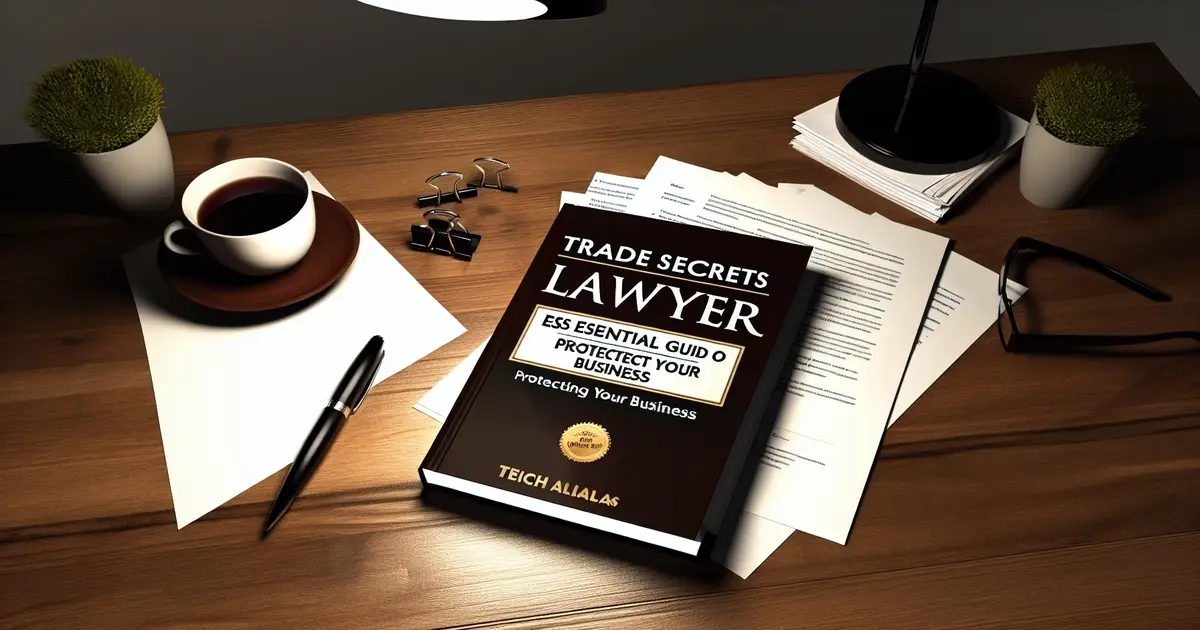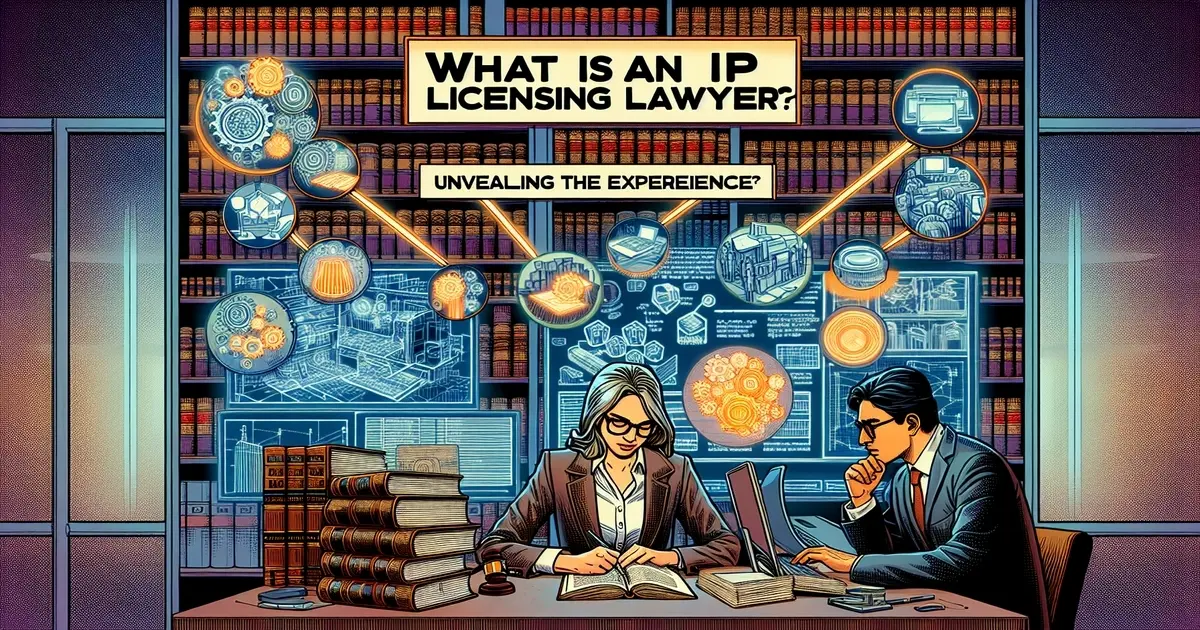Patent Lawyer: Career Guide
Over 300,000 patents are filed in the United States each year, highlighting the critical role of patent lawyers in innovation and intellectual property protection. Navigating the complex maze of patent law without a seasoned expert can be like trying to solve a Rubik's cube blindfolded.
A patent lawyer doesn't just fill out paperwork; they're your guide through securing your inventions. They ensure that your brilliant ideas get the legal armor they deserve, protecting them from being copied or stolen.
Understanding what a patent lawyer does is the first step towards turning your innovations into protected assets, setting the stage for success in today’s competitive market.
Table Of Contents
Understanding Patent Lawyers' Roles
Dual Expertise
Patent lawyers stand at the crossroads of law and technology. They must grasp complex technological advancements to protect their clients' innovations effectively. This dual expertise allows them to understand and articulate the unique aspects of each invention they represent.
They navigate through intricate legal frameworks while keeping pace with rapidly evolving technologies. Their role demands a deep understanding of patent law and the specific technical field related to the patent application. This unique blend of skills ensures that inventors receive comprehensive protection for their creations.
Application Process
The journey from invention to patent grant is fraught with complexities. Patent attorneys guide inventors through this labyrinth, ensuring every step is meticulously handled. From drafting detailed patent applications to responding to office actions, they employ strategic thinking at every turn.
Their work begins with assessing an invention's patentability, followed by crafting claims that accurately reflect the novel aspects of the technology. They then argue these points persuasively before patent examiners, addressing any objections with precision and insight. This process secures intellectual property rights and maximizes the scope of protection.
Client Representation
Patent attorneys serve a diverse clientele, ranging from individual inventors dreaming big to multinational corporations innovating at scale. Their adaptability in representing such a wide array of interests underscores their versatility and depth of knowledge.
Solo inventors often become trusted advisors, guiding them through unfamiliar legal territory. In contrast, when representing large companies, they work as part of a larger team, strategizing over vast intellectual property portfolios. Their ultimate goal is to safeguard innovations against infringement and competitive threats regardless of client size.
Litigation Expertise
Beyond securing patents, these attorneys are skilled litigators in patent disputes. Whether enforcing a patent against infringers or defending against infringement allegations, they bring a strategic approach to litigation. Their deep understanding of legal principles and technological nuances makes them formidable advocates in court.
They analyze each case's merits, advise clients on litigation risks and rewards, and, if necessary, represent them through every trial phase. This aspect of their work protects clients' existing patents and reinforces the overall value of their intellectual property assets.
Patent Lawyer vs. Patent Agent
Legal Representation
Patent lawyers possess the unique ability to represent clients in court. This sets them apart from patent agents. They can defend an inventor's claims or challenge infringements. This capability stems from their comprehensive legal training and licensure.
They undergo rigorous education, including law school, and must pass the Bar exam. This prepares them for the complexities of legal disputes over patents.
Educational Background
The educational path for a patent lawyer is more extensive than a patent agent's. It includes obtaining a law degree, which is not required for agents. Patent lawyers must also pass the Bar exam, a critical distinction.
Patent agents typically have a strong background in science or engineering. However, they do not need to attend law school. They focus more on the technical side of patents than the legal aspects.
Task Capabilities
Both patent lawyers and agents can perform essential tasks like preparing and filing patent applications. They work closely with inventors to ensure that every detail of an invention is accurately documented.
However, patent lawyers offer broader services due to their legal expertise. They can provide strategic advice on managing a patent portfolio and navigating complex intellectual property laws. Their role encompasses more than just the application process; they can also engage in litigation and offer comprehensive legal counsel.
This makes them invaluable for individuals or companies looking to protect their inventions comprehensively.

Educational Path to Becoming a Patent Lawyer
Undergraduate Studies
The journey to becoming a patent lawyer starts with an undergraduate degree. This phase typically takes four years. Candidates often choose majors in science or engineering fields. This background is crucial for understanding the complexities of patents, especially those related to technology and innovation.
They must excel in their studies, aiming for high GPAs. This academic excellence helps secure admission into top law schools. The choice of major is not just about meeting requirements. It shapes their analytical skills and deepens their technical knowledge.
Law School Admission
After completing their undergraduate degree, aspiring patent lawyers must pass the Law School Admission Test (LSAT). High scores are pivotal for entering prestigious law schools. The LSAT measures critical thinking, analytical reasoning, and reading comprehension.
Preparation for this exam often involves months of study. Many candidates take prep courses or study groups to enhance their performance.
Law School Education
Law school spans three years, making the total educational journey seven years long. During this time, students dive deep into legal theories and practices. They learn about various aspects of law but should focus on intellectual property (IP) law if they aim to become patent lawyers.
Specialized courses in IP law are essential. They provide insights into copyrights, trademarks, and patents. Internships at law firms or companies specializing in patents can offer practical experience and networking opportunities.
Advanced Degrees
Patent lawyers go beyond the standard education path by obtaining advanced degrees in science or engineering, such as master's or even Ph.D.s. These degrees give them an edge in understanding complex technological innovations that require patent protection.
This additional expertise makes them highly sought after by tech companies and research institutions. Their ability to bridge the gap between technology and law is invaluable.
Critical Degrees for Aspiring Patent Lawyers
Bachelor's Degree
Earning a bachelor's degree is the first step for aspiring patent lawyers. This isn't just any degree, though. It needs to be in science or engineering. Law schools look for candidates with strong backgrounds in these fields, ensuring applicants have the foundation to understand complex technical issues.
A bachelor's degree typically takes four years to complete. Students dive deep into biology, chemistry, physics, or engineering disciplines. They develop critical thinking and problem-solving skills essential for patent law.
Advanced Degrees
A Master's or Doctoral degree in science or engineering can set you apart. These advanced degrees offer a deeper understanding of technical domains. They make it easier to grasp client inventions.
While not required, these degrees can significantly benefit your career as a patent lawyer. They demonstrate an elevated level of expertise and dedication to the field. This can be especially valuable when dealing with intricate patent applications and litigation.
Advanced degrees usually take two to six years beyond the bachelor’s level. The time depends on the field of study and the nature of the research involved.
FE Examination
There's another path for those without a traditional science or engineering undergraduate degree. Passing the Fundamentals of Engineering (FE) examination becomes crucial. This test proves your proficiency in engineering principles.
The FE exam is an alternative way to meet the technical background requirement for becoming a patent lawyer. It benefits individuals who may have pursued different undergraduate majors but later developed an interest in patent law.
The FE exam requires dedicated preparation, covering various aspects of engineering knowledge. Success in this exam underscores your commitment and ability to tackle the challenges of patent law from a technical standpoint.
Navigating the USPTO Exam
Exam Requirements
Passing the United States Patent and Trademark Office (USPTO) exam is crucial for patent lawyers and agents. This requirement ensures they can practice in the United States. The exam, often called the patent bar, assesses one's knowledge of patent law and USPTO procedures.
It's open to those with specific technical backgrounds or degrees. This ties back to prior discussions on critical degrees for aspiring patent lawyers. These educational qualifications are vital for eligibility.
Study Strategies
Adequate preparation is vital to conquering the USPTO exam. Candidates often turn to study materials and courses designed specifically for this purpose.
Comprehensive review courses, both online and in-person, offer structured learning paths. They cover essential topics like patent filing processes and infringement laws. Official USPTO materials provide invaluable insights into exam expectations.
Practicing with past exam questions helps familiarize candidates with the format and types of questions asked. Many find forming study groups beneficial for mutual support and knowledge exchange.
Professional Significance
Being admitted to practice before the USPTO is more than just a professional milestone; it’s a gateway to a rewarding career in patent law. It allows individuals to represent inventors in filing patents and protecting intellectual property rights.
This admission validates one’s expertise in patent law and significantly enhances their credibility in the field. It opens opportunities across various sectors, including technology, pharmaceuticals, and engineering.
Insights into Patent Lawyers' Salaries
Salary Overview
The financial landscape for patent lawyers and agents has grown significantly. The average salary for a patent lawyer now stands at approximately $140,000 annually, a noticeable increase from previous years, underscoring the profession's lucrative nature.
While not holding a law degree, patent agents also enjoy substantial earnings. Their average salary hovers around $100,000 per year. This distinction in pay reflects the additional legal qualifications and responsibilities that patent lawyers carry.
Growth Trends
The salary growth trend for patent professionals over the past few years is impressive. Since 2020, patent lawyers have seen their salaries rise by over 15%. This increase is partly due to the growing complexity of intellectual property law and the high demand for skilled individuals capable of navigating it.
The salary increment for patent agents has been slightly lower but still significant, at around 10%. The consistent upward trend highlights the value of expertise in this field and its resilience even in fluctuating economic conditions.
Influencing Factors
Several factors contribute to variations in salaries among patent professionals. Geographic location plays a crucial role. For instance, Silicon Valley or New York City patent lawyers can expect to earn significantly more than their counterparts in smaller cities or towns due to the higher cost of living and concentration of tech companies.
Experience level is another critical determinant. Entry-level positions may start at lower salaries, but substantial pay increases come with each year of experience. Specialization within specific high-demand technology sectors can also lead to higher earnings.
Another factor affecting salaries is the type of employer. Lawyers in large multinational corporations or top-tier law firms often command higher salaries than those in government roles or smaller practices.
Career Opportunities for Patent Lawyers
Law Firms
Patent lawyers often start their careers in law firms. They assist inventors and companies by securing intellectual property rights for new inventions. This work involves drafting and filing patent applications, negotiating licenses, and representing clients in infringement cases.
Law firms offer a structured environment where patent lawyers can hone their skills. They learn to navigate complex legal frameworks and understand the nuances of patent law. Many also gain exposure to various industries, from pharmaceuticals to technology.
Corporations
In-house roles at corporations present another avenue for patent lawyers. Here, they become integral parts of the company's innovation process. Their job is not just about protecting patents but also advising on research and development strategies.
Working in a corporation means being closer to the product development cycle. Patent lawyers assess the patentability of inventions before significant investments are made. They ensure that the company's innovations are protected globally, which is crucial in today's interconnected market.
Government Agencies
Government agencies like the United States Patent and Trademark Office (USPTO) also employ patent lawyers. These roles involve reviewing patent applications to determine if they meet legal standards.
Working for a government agency offers a unique perspective on the patent system. Lawyers see firsthand how policy affects innovation. They play a critical role in shaping the future of intellectual property law by ensuring that only deserving inventions receive patents.
Emerging Technologies
The rise of emerging technologies has created new opportunities for patent lawyers. Fields such as artificial intelligence, biotechnology, and renewable energy need experts who understand the technology and the legal landscape.
Patent lawyers help protect groundbreaking innovations that can change the world. Their expertise ensures that inventors have exclusive rights to their creations, encouraging further investment in research and development.
Intellectual Property Strategy
Patent lawyers transition into roles focusing on intellectual property strategy and policy. They advise governments, international organizations, or large corporations on fostering an environment where innovation thrives.
These roles require a deep understanding of both law and technology. Lawyers influence decisions that affect global innovation trends, making it a highly impactful career path.

Networking and Mentorship in Patent Law
Career Growth
Networking plays a crucial role in career development for patent lawyers. It opens doors to new opportunities and clients. Individuals can meet seasoned professionals by attending industry conferences and joining law forums. These connections often lead to valuable advice on drafting patents and handling complex cases.
They also learn about the latest trends in patent law. This knowledge is essential for staying ahead in a competitive field. Networking helps patent lawyers find mentors who can guide them through their careers.
Finding Mentors
Mentorship is invaluable for aspiring patent lawyers. A mentor provides insight into the nuances of patent law that are not found in textbooks. They share their experiences, both successes and failures, which can help newcomers avoid common pitfalls.
Mentors assist in honing skills like client communication and effective patent drafting. They may introduce mentees to their network, further expanding the latter's professional circle. This guidance is crucial for those looking to specialize in specific areas of patent law.
Professional Organizations
Joining professional organizations dedicated to patent law is another way to build a network. Groups such as the American Intellectual Property Law Association (AIPLA) offer resources for both novices and experts in the field.
These organizations host events where members can connect with others who share their interests. They provide platforms for discussing current issues in patent law, offering a broader view of the field. Members get access to exclusive job listings, helping them advance their careers.
Staying Current in Patent Law
Legal Updates
The field of patent law is dynamic, with frequent changes to regulations and legal precedents. For patent lawyers, staying abreast of these updates is not optional but essential. They must understand the latest legal frameworks and how they apply to new inventions or licensing agreements.
This requires them to regularly review changes in patent law, including amendments to existing laws and the introduction of new ones. They also need to monitor rulings from significant cases that could affect how patents are filed, defended, or enforced. This vigilance ensures they can offer clients accurate and timely advice.
Technological Trends
Patent law intricately ties with technological innovation. As such, patent attorneys must keep pace with advancements in various fields of science and technology. This knowledge isn't just about understanding the invention they're protecting; it's about foreseeing potential legal challenges or opportunities for licensing and commercialization.
They achieve this by engaging with scientific journals, attending tech expos, and sometimes collaborating directly with inventors during development. Such practices help them grasp the practical aspects of new technologies and their implications for the patent system.
Continuous Learning
Continuing Legal Education (CLE) programs are crucial in a patent lawyer’s professional development. These programs cover recent developments in patent law, offering insights into both domestic and international patent systems. Participation in CLE ensures that attorneys remain competent and meet legal requirements and client expectations.
Moreover, engagement with scholarly articles allows lawyers to delve deeper into complex legal theories related to patents. It sharpens their analytical skills and enables them to contribute meaningfully to debates on future directions of patent law.
Professional Engagement
Networking isn’t just about building relationships; it’s also a learning opportunity. By interacting with peers at industry conferences or professional forums, patent lawyers exchange valuable information on emerging trends and best practices.
These interactions often spark discussions on challenging aspects of patent applications, enforcement strategies, or case law interpretations. Through such engagements, attorneys can gain practical insights not readily available through formal education channels.
Final Remarks
Patent lawyers stand at the crossroads of innovation and law, guiding inventors through the complex landscape of intellectual property rights. Your journey to becoming one involves mastering legal principles, passing the challenging USPTO exam, and continuously evolving with the field. This path is not just about securing a well-paying job; it's about becoming a key player in protecting groundbreaking inventions. Networking, mentorship, and staying updated are your tools for success in this dynamic career.
As you navigate your way into patent law, remember the importance of each step—from understanding the role to leveraging career opportunities. The world of patents awaits your contribution. Ready to take that first step? Dive deeper into the specifics of patent law, connect with mentors, and start shaping your future today. The impact you can make is immense—both for inventors and the advancement of technology.
Frequently Asked Questions
What is a patent lawyer?
A patent lawyer specializes in patent law, helping inventors secure patents for their inventions and navigate legal issues related to patents. They represent clients in obtaining patents and act in litigation involving patent rights.
How does a patent lawyer, with preferences in certain areas, differ from a patent agent, who may focus on inventor needs, among others?
While both can prepare and file patent applications, a patent lawyer can provide legal advice, represent clients in court, and handle legal disputes. Patent agents cannot practice law or represent clients in legal matters.
What educational path, in areas related to the inventor's title, is needed to become a patent lawyer?
To become a patent lawyer, one must earn a bachelor's degree (preferably in science or engineering), graduate from law school, pass the state bar exam, and pass the USPTO exam.
What are critical degrees for aspiring patent lawyers?
Aspiring patent lawyers should pursue degrees in fields like engineering, computer science, chemistry, or biology to meet the technical qualifications for the USPTO exam, followed by a law degree.
How do you navigate the USPTO Exam?
Studying USPTO materials, taking preparatory courses designed for the Patent Bar Exam, and practicing with sample questions are effective strategies for navigating and passing the USPTO Exam.
What are insights into patent lawyers' salaries?
Patent lawyers' salaries have varied widely in recent years based on experience, location, and specialization. However, they generally command high salaries due to their specialized knowledge and skills in intellectual property law.
What career opportunities exist for patent lawyers?
Patent lawyers have diverse career opportunities, including working in law firms specializing in intellectual property, corporate legal departments of tech companies, government agencies like the USPTO, or as independent consultants.
Related Post
IP Litigation Lawyer
In the fast-paced world of innovation and creativity, protecting your intellectual property (IP) has never been more crucial. Enter the IP litigation lawyer, a specialized legal eagle who swoops in to defend your inventions, brand names, and artistic works from infringement and misuse.
Read MoreTrademark Lawyer
Have you ever wondered who, after a thorough trademark search and navigating the trademark application process with a trademark law firm, guards the uniqueness of your brand as a registered trademark?
Read MoreCopyright Lawyer
In the digital age, where content creation and distribution over the internet are at an all-time high, a staggering 90% of creators will face copyright issues with their original work during their careers, often involving patents and documents.
Read MoreTrade Secrets Lawyer
Have you ever wondered how enterprises keep their secret sauce, or commercial information, under wraps through patent protection and avoid commercial espionage?
Read MoreIP Licensing Lawyer
Have you ever wondered who stands guard over the fortress of intellectual property, ensuring that inventors, creators, and licensors reap the rewards of their innovation through licenses?
Read MoreIntellectual Property Lawyers
Who stands guard over the fortress of your creative genius or innovative breakthroughs, offering legal talent and counsel to help advance your career?
Read More






